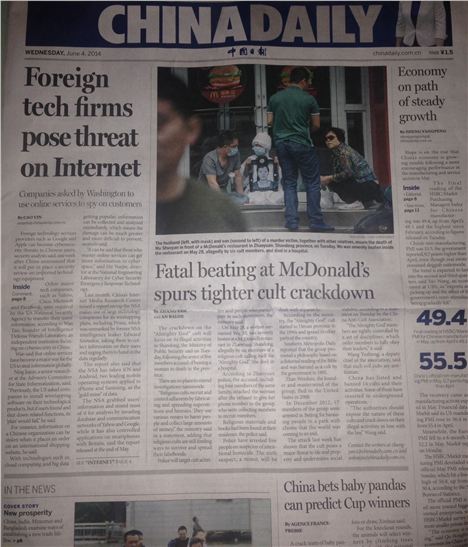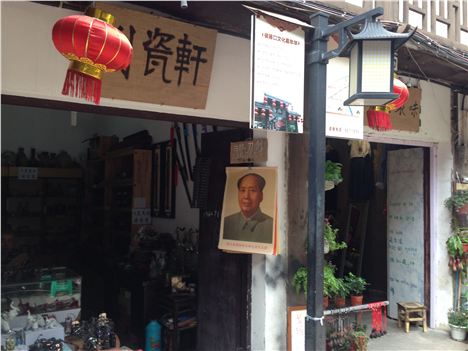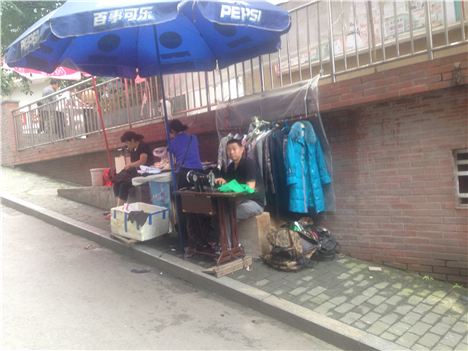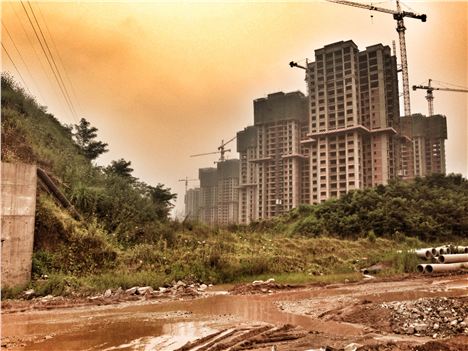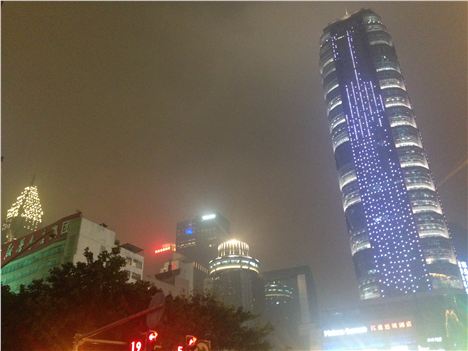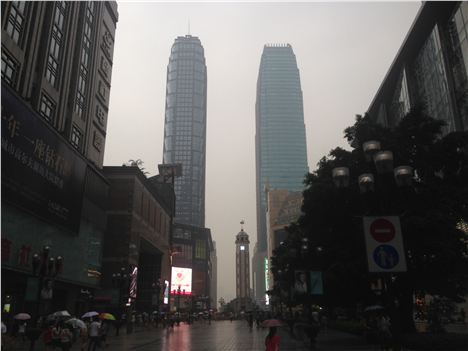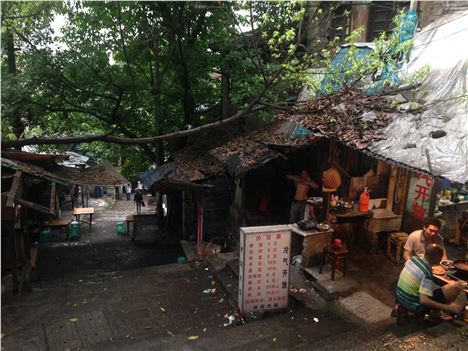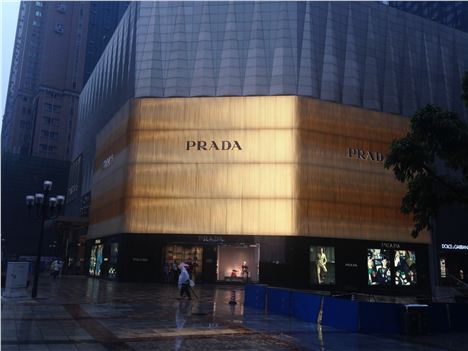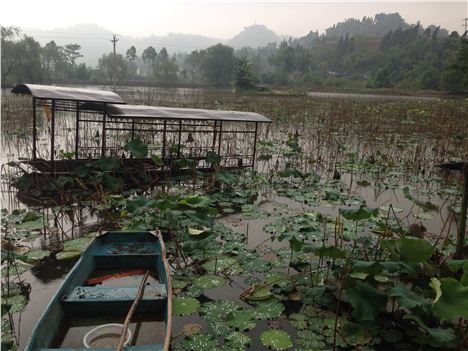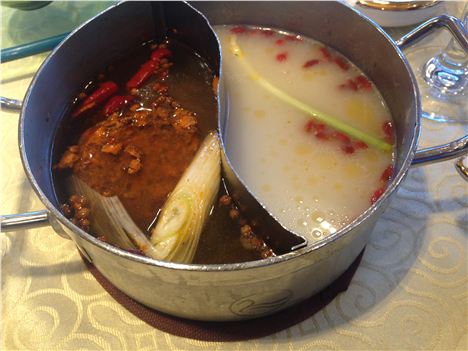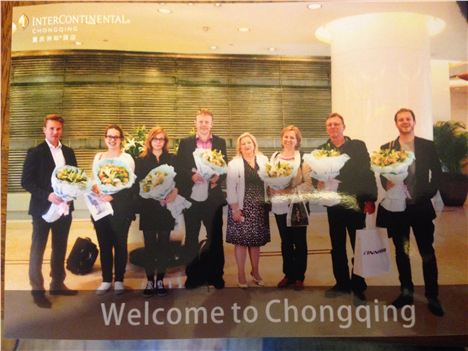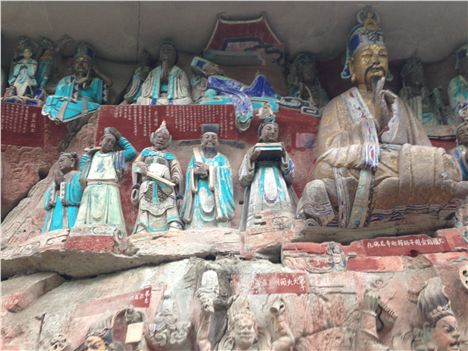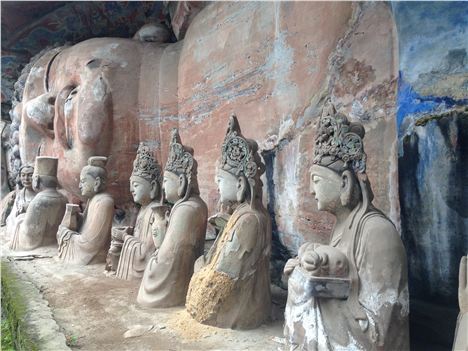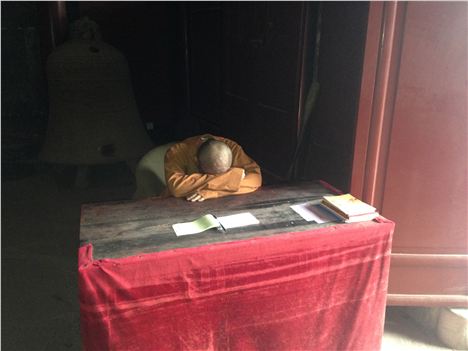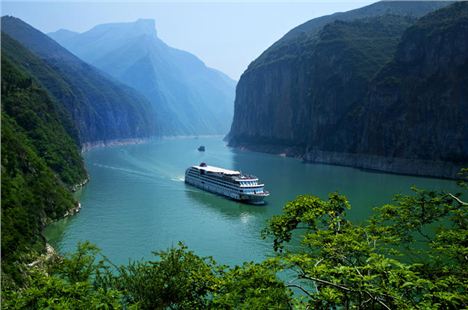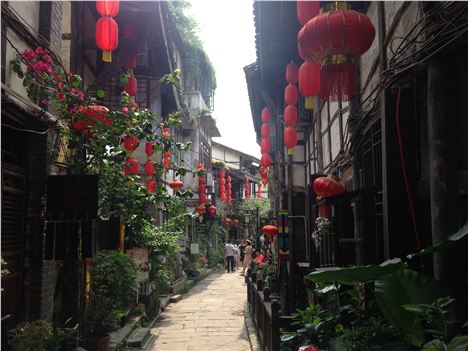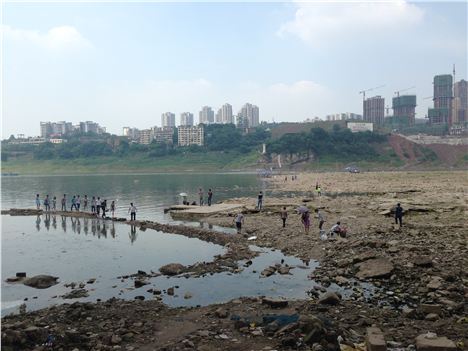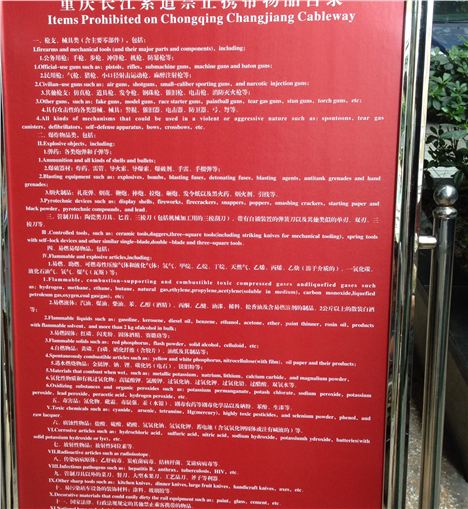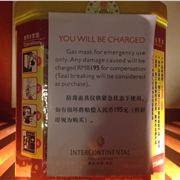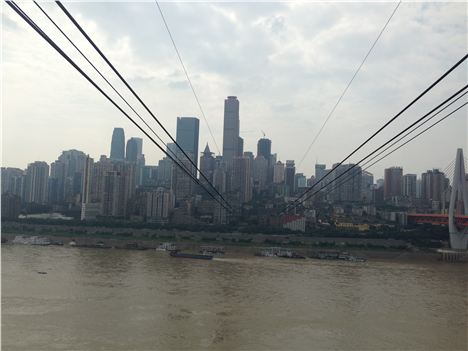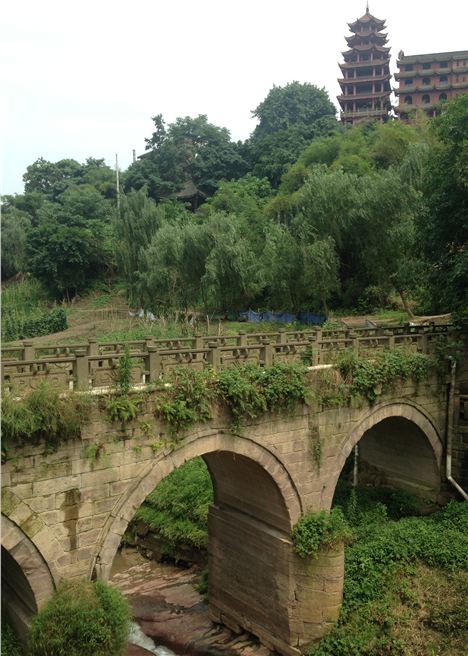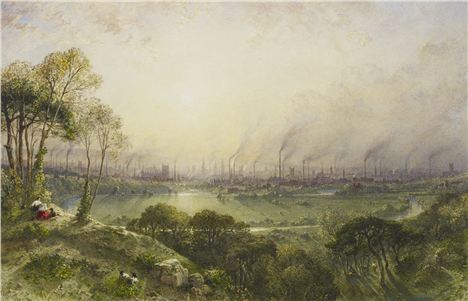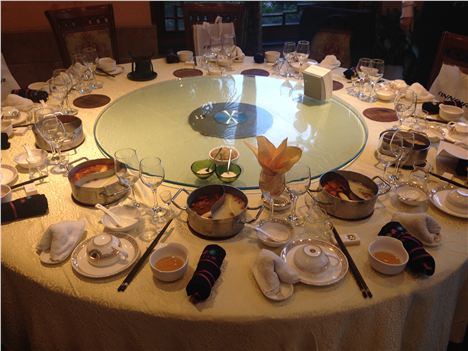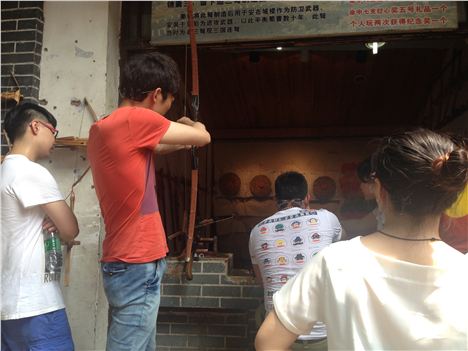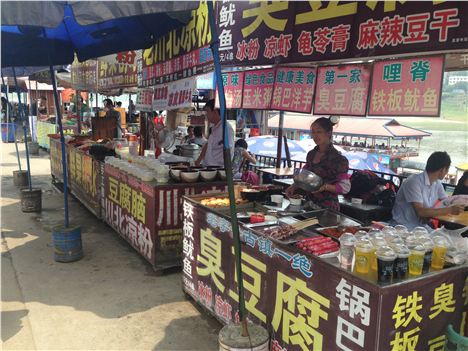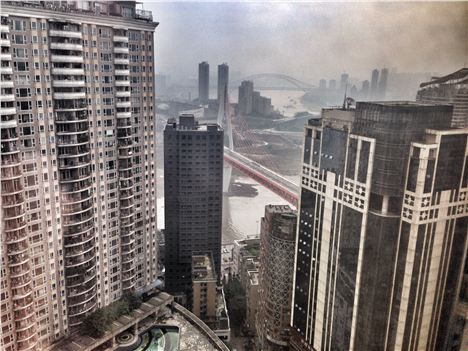Censorship In My Hands
On Wednesday 4 June I was in Chongqing, China. It was the 25th anniversary of the Tiananmen Square Massacre. The media was in shutdown. On BBC News 24 the screen went blank when Tiananmen was mentioned.
On the same day China Daily, the English language newspaper, led with ‘Foreign tech firms pose threat (to China) on Internet’. At the bottom of the front page was a big story called ‘China bets baby pandas can predict World Cup Winners’. Tiananmen mentions were purged.
China Daily misses the scoop of the day
I couldn't boot up social media to display my dismay at these Cold War tactics. Twitter, Facebook, Instagram are blocked. I found this restful - no pressure to connect and talk rubbish, but it's so old fashioned. Classic totalitarian paranoia.
Chairman M, dead these past 38 years would be proud, although he'd probably feel queasy at what has happened in the last two decades in China.
I wouldn't have missed it for anything. So while the 'disappearance' of the past, the censorship and much else is disturbing, am I glad I went to China?
The Chairman would approve of the censorship if not other aspects of the new China
The Accelerated City
I visited Chongqing (pronounced Chong-ching). This lies in China’s south west, seven hundred miles from any coast. Its central area is a Manhattan at the confluence of two rivers, the Yangtze and the Jailing.
What comes as a shock is the width of the Yangtze River. Despite being hundreds of miles from the sea, the third longest river in the world (3,915 miles), is as wide as the Mersey at Liverpool.
 Yangtze, in the middle and right, gathers the waters of the Jailing River, on the left.
Yangtze, in the middle and right, gathers the waters of the Jailing River, on the left.
The population of the central government run municipality is around 10m within a wider Chongqing ‘municipality’ of some 30m. There has been a 395% increase in GDP in a decade - the UK has been lucky if it exceeded 1% each year in the same period, sometimes it's been below zero.
With that GDP rise it's no surprise the city is the fastest growing place in this country of £1.3bn people. It has a fistful of epithets including Furnace City, Mountain City and Foggy City.
The names are inspired by steep hills and the baking sub-tropical temperature with its cruel humidity. The heat evaporates the rivers creating an ever present haze. Pollution compounds the issue. Clear, blue sky, long view days are rare. We never had any.
Streetscene - anyone for a stitch?
The first, second and third thing you notice about Chongqing are apartment blocks. They're also the fourth, fifth and sixth thing.
The apartment blocks are around 30-40 storeys high (Manchester’s Beetham Tower at 47 storeys is easily the city’s tallest structure). On one occasion I tried to count the apartment blocks in just one view down the Jailing River. I lost count at fifty three. On the city fringes half-completed residential blocks gang up on the heavens like bullies.
On the city fringes the tower blocks are being thrown up
Downtown And Goodbye Town
Away from the parade of apartments, night time in the city centre is anything but drab.
Neon has a party downtown with European brands battling to be the life and soul. Prada probably wins with its wall of gold.
Misty neon majesty
I was in Chongqing on a press trip and my group included writers from Estonia, Germany, Finland and Denmark.
Someone pointed out how all the backlit models shown in twenty metre portraits advertising watches and perfumes were Western. As with openness in accepting the unpalatable past China also lacks confidence in putting its national heroes up in lights.
On Bar Street (I couldn't work out if that was the real name or a nickname) you sit and watch as kids pose and preen, boys with bouffant hair like supercharged rockabillies, girls in short skirts and precipitous heels. Every now and then a boot-polisher arrives, street vendors shout over each other. It's excellent people-watching.
What is notable is the lack of edge about the evening. No hideous hen party stumbles by, no stag party muscles through looking for trouble. Here all is smiles and genuine youthful excitement with an admixture (very small) of older folks. It feels fun. It feels very Chinese, all evening I saw no other Westerners.
Liberation Monument is 75ft (25m) high. It marks Chongqing’s role as a centre of resistance to the Japanese in World War II. Apparently it was the tallest structure in the city until a couple of decades ago.
Liberation Monument, with its clock shining, is today a little over-shadowed
Yet not all is glittering success even here. One of the tallest towers in the whole city, the one with Prada in gold neon at its base, has run out of money half way up and lies abandoned. No-one knows when it might be completed.
Down from the main drag there’s a terrace with a view to the Yangtze, or a bit of it. Underneath the terrace is a fallen away, litter strewn moment of former reality, of normality pre-economic surge. This is the last surviving hint of Chongqing before the neon towers.
People cook hotpots in the open and roast food and light fires. There are hairdressers and nail clippers and mahjong and people getting by.
A bit of pre-glossy city centre
“You should keep these little bits of the old stuff,” I say in a bar before dinner. “Even if you sanitise it and make it part of a tourism package, this insight of what was before will give you context, make the tourism experience part of a historical process, show people how you got to where you are.”
“There are developers moving in before next year. It’s being demolished,” comes the reply with a shrug. “More glass towers and that will be the end of old Chongqing. We think it’s dirty anyway. Old."
“In cities like this the Chinese don’t like being reminded of the old things,” said a Westerner based in the country. She said it on the day of the Tiananmen Square Massacre news blackout.
Prada wins the glitz award
Food Brilliance
One thing was consistent in Chongqing; the food was exceptional.
Food in every meal we had was glorious.
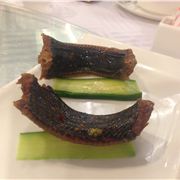 Very nice snakeThe snake in the first restaurant, Wai Po Qia, was bony but oily, healthy like a good mackerel. At Shinfang One Two Three restaurant we ate delicate amphibian. "The frog was truly excellent,” said Antii from Finland in his best Bond villian voice, steepling his fingers.
Very nice snakeThe snake in the first restaurant, Wai Po Qia, was bony but oily, healthy like a good mackerel. At Shinfang One Two Three restaurant we ate delicate amphibian. "The frog was truly excellent,” said Antii from Finland in his best Bond villian voice, steepling his fingers.
The vegetables were cooked everywhere with a lightness of touch that was pure delight. The fish and pork dishes were massively flavoured yet artfully nuanced.
In the lovely Lotus Restaurant, eighty miles west of Chongqing, another meal was taken in wooden pavilions seemingly floating on a lake filled with lotus flowers. As we ate a couple of kitchen staff caught fish from a nearby walkway.
When we departed staff threw any unfinished steamed fish, rice, soy sauce and so on out of the window into the lake. A very efficient method of clearing the slops. Not sure that happens out of the back of hotels on Lake Windermere. Maybe it adds flavour to the fish in the lake. "I'd like my fish with digested soy sauce please."
View from the restaurant across the lotus flower lake at The Lotus Restaurant
The standout meal was the Chongqing speciality, the hotpot.
Taken in Hong Ya Dong restaurant, this was so good I would have broken into a Chinese folk dance if I'd known any.
You get a bubbling spice laden ‘hotpot’ and a spin-table of raw materials. You cook the latter yourself in the hotpot, before cooling it in a bowl of sesame oil laced with various herbs and spices of your own choosing; I went coriander heavy.
Claudia from Germany summed up all our thoughts around the table: “This has got to be my new favourite way of eating. All these flavours and the time it takes means it's a perfect social meal.”
The hotpot bubbling away, spicy on the left the way the locals like it, mild on the right
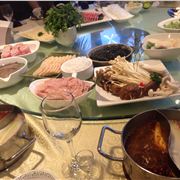 Spin-table stocked upA notable characteristic of eating out in restaurants was the lack of couples eating alone. I saw groups of men, family groups, once a group of women, but no couples.
Spin-table stocked upA notable characteristic of eating out in restaurants was the lack of couples eating alone. I saw groups of men, family groups, once a group of women, but no couples.
Young couples were wandering the streets outside in Chongqing hand in hand but in no establishment did we see middle-aged lovers sharing a meal. Cultural differences are in the end the quality that makes travel a joy.
Not that the violently loud hawking and spitting in public is an attractive cultural difference. “It seems there are a lot of sick Chinese people,” said Nikolai from Germany, drolly.
Chinese visitors to Britain on Saturday nights probably wonder why so many people are ill with incontinence on city streets.
There was a downside to the Chongqing dining and drinking. Close to the Hong Ya Dong restaurant there's an ‘Irish Pub’. Lord, is there no escape? When we get to Mars will we find one already set up?
So a Finn, a German, an Estonian, a Brit, a New Zealander, another Finn, a Dane and another German walk into the Intercontinental in Chongqing.... Sharon Fraser, the New Zealander, centre right without flowers, is the generous and very informative General Manager
Buddha In High Enlightment In The Rocks
“This is special, something easy to write about,” Merit from Estonia remarked when we got to the Baoding Shan not far from Dazu.
Remarkable work under the rocks
Between 1175 and 1245 a monk called Zhao Zhifeng oversaw the carving in a horseshoe shaped gully with limestone walls of a remarkable series of sculptures and reliefs. These display Buddhist scriptures heavily influenced by Daoist and Confucian principles of filial piety.
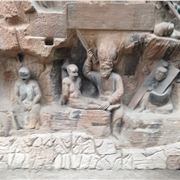 Drunks in HellTo get round takes time and you need either a guide or a guidebook to understand the references and symbolism.
Drunks in HellTo get round takes time and you need either a guide or a guidebook to understand the references and symbolism.
It's not hard to fall in love with the stone allegories. The way a farmer tames a water buffalo so they work in harmony rather than pulling apart is a sweet way of reminding us how we have to tame our passions and intellect.
The drunks in hell hit too close to the bone for my liking. One has no tongue, one is having his head removed, while a demon chops the legs from another. These remind us of the state drink puts us in - talking gibberish, off your head, legless. I avoided mirrors for a while.
The wow sculpture is the 15m reclining Buddha, fitted cunningly within the available rockface and accompanied by lifesize officials and emperors lined up in front. He's lying there in the highest statement of enlightenment. He looks snug.
Merit was approached by a street seller on the way back to the mini-bus. The old woman wanted her to buy a small box of jade Buddhas. "Twenty!" the old woman shouted. When Maret shook her head the woman bellowed louder, "Thirty!" Reverse haggling isn't going to catch on.
The big Buddha
Give Dazu and its sculptures a big tourist tick.
The steamy climate, the way the sculptures were grouped round a wooded ravine of great beauty, was satisfyingly Eastern, stimulatingly exotic.
A Buddhist monk takes five or sneakily reads text messages
Three Gorges, Guides, Old Towns And Anthrax
“What do people come to Chongqing for?” Jens from Denmark asked John, our local Chinese guide, a man who had seemingly won the National Non-Smiling Championship five years running and was training hard to make it six out of six. Next year he was probably going to take it to international level.
As a registered tour guide myself I pride myself in knowing a bit about the craft. There are several qualities needed in a good guide. They include the ability to capture the imagination of those you guide through knowledge, personality and delivery. You also need to know where you are going and have a voice that is clear and can be heard.
John's favourite guiding characteristic was to herd people and look impatient. This was strange as most other people we met in Chongqing showered us with smiles and tried to help.
“People don’t come to Chongqing for the city, they come here to take the Three Gorges Tour,” John told Jens.
Three Gorges Cruise
This is probably true. Chongqing has developed so fast it’s trampled gleefully over its past, leaving few classic tourist sites - but enough for a really fascinating walking tour should people like John give it a booster. A good guided stroll could take in the Liberation Monument, the Great Hall of the People, the Luohan Si temple, tell the story.
I'd love to learn the route and guide it myself, maybe I should offer my services to the Chongqing tourist board.
The Three Gorges tours scoot people down the Yangtze for several hundred miles through the fabled three gorges, where wild, beautiful scenery closes in. The river isn’t so treacherous now as the waters have been calmed by the controversial Three Gorges Dam, but apparently if there’s time, this cruise is the thing to do, and is impressive in all weathers.
We didn’t have the time so it was a 15km drive to Cicique, an old town preserved in a very self-conscious way with narrow streets, paved roads and several thousand stalls selling all manner of street foods, traditional goods and plastic toys. It was packed with mainly Chinese tourists.
Pretty buildings in Cicique
I took a stroll down to the river at Cicique.
Strangely, the local authority had built a motorway on a viaduct dominating the old town. On a bedrock and building rubble outcrop the locals fished, an outlet pipe vomiting waste next to them.
Fishing in the effluvia
Back in Chongqing we took the ‘famous’ cableway across the Yangtze. The checklist of dangerous items not allowed included ‘All kind of mechanisms that could be used in a violent or aggressive nature such as defibrillators’. We checked our pockets just in case, but we’d left our defibrillators along with any anthrax, another banned item, back at the hotel.
Vicious defibrillators
Mind you, we could have brought a gas mask, which for reasons unknown lay next to the mini-safe in our Intercontinental Hotel room.
(Incidentially this hotel had been besieged by the British press ten days before I'd arrived. Vince Cable, Secretary of State for Business was staying at the Intercontinental on a trade mission when rumours circulated he was stabbing his Liberal Democrat Party Leader, Nick Clegg, in the back. Cue the press rush - very different from China and Tiananmen.)
From the far side of the Yangtze we looked back at the economic miracle of the last two decades of Chinese life as revealed by the skyscrapers of central Chongqing.
“Can we find a bar on this side of the river for a beer?” we asked John as we clambered into a mini-bus. The view of the city centre would have been better enjoyed with liquid. He looked angry.
“There are no bars here,” he said sternly as we immediately drove past a clearly open bar.
John was in a rush because he wanted to show us a square closed for renovation. John so loved this square he showed us another view of it. It remained stubbornly closed for renovation. Remarkable guiding.
Chongqing from the cable car
Time For China
The trip left me with only one conclusion to draw. If you get chance to go to China, take it.
There aren’t many opportunities to walk into one of the most tumultuous economic and social upheavals in global history. The scale of the thing in China can be terrifying and depressing, but at the same moment is awe-inspiring and mesmerising.
Chongqing is categorically not a natural tourist city - except as a base to visit Dazu and take the Three Gorges tour - but provides sensory overload for an intelligent visitor (and with a bit of work could provide much more obvious delights for the visitor).
If you're touring China it's a fine place to begin the grand tour and with Finnair flights, convenient for Manchester.
Tourism becomes what it should be here, something which makes you think, something memorable.
I have a friend who told me he wouldn’t visit China because at the back of his mind the lamentable human rights would worry him too much. (Women's rights, or the lack of them, are painfully exposed in this year’s Leftover Women by Leta Hong Fletcher).
His position is principled, understandable, but, to my mind, involves turning your back on the world.
A visit to Chongqing helps you understand the human condition and the possible direction in which human history is flowing whether we like it or not. Tourism becomes what it should be here, something which makes you think, something memorable, even when it isn't pleasant.
And at least in China you always get great food. Although the provenance of that might be something else to worry about. Let's not mention animal rights.
View into Cicique, 15km from central Chongqing
As a Greater Mancunian, Chongqing provides priceless echoes of our own past.
In the early part of the nineteenth century people came from all over the world to be appalled or excited by the new industrial society Manchester represented.
'Here are factories, seven or eight storeys high, bigger than the Royal Palace in Berlin, working day and night,' wrote Karl Friedrich Schinkel, the acclaimed German architect, in 1826. We were the go-to place for those who wished to rubber neck the future - Manchester was the 'shock city of the age'.
For Manchester, 1826, read Chongqing, 2014. In the 1851 census Britain became the first country with more people living in towns and cities than in the country. In 2012 China made the same transition. Delicious and terrifying echoes.
Manchester, a forest of chimneys. The early nineteenth century 'shock' tourist centre
While we might regret the way the Chinese seem to have let industry rip through much of their long past (although Mao’s Cultural Revolution was probably even more destructive) and tear up much of their beautiful countryside, remember we did the same, we set the precedent. Let's not be too superior about the changes in China, however we might deplore their state censorship, human rights and animal welfare.
It remains the fact China is exciting, bewildering and overwhelming but more than worthwhile visiting.
Just don’t go tweeting that while you're there. It'll be pointless.
You can follow Jonathan Schofield on Twitter @JonathSchofield or connect via Google+
Factbox
I flew from Manchester on Finnair to Helsinki and then on to Chongqing. Prices start under £500 return. The route via Helsinki is the fastest to the Far East from Manchester. The service standards are as high as the cruising altitude on Finnair and includes one of the more intelligent airline wine selections. Thanks to Manti for organising the whole trip very smoothly. A tip: whilst cruising at 40,000 feet over Siberia don't watch the same in-flight movie I did. Gravity can make you nervous. Sandra Bullock's a proper screamer.
We stayed in the Hotel Intercontinental where very large, very comfortable rooms with views are available for as low as £90 per night. Service standards are high, as with Finnair, and the breakfasts involving bacon, eggs, fried noodles, dumplings, fresh veg, beans - a curious combo of East and West - are superb.
The hotpot table waiting for the ingredients to cook up
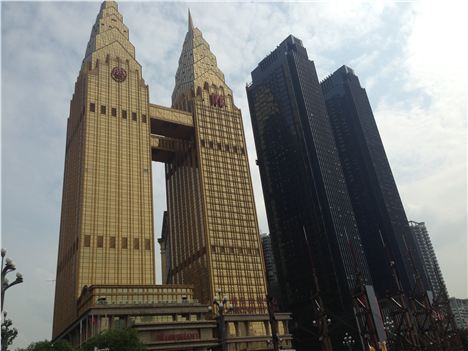 Golden towers - glitz is popular as in the Trafford Centre
Golden towers - glitz is popular as in the Trafford Centre









